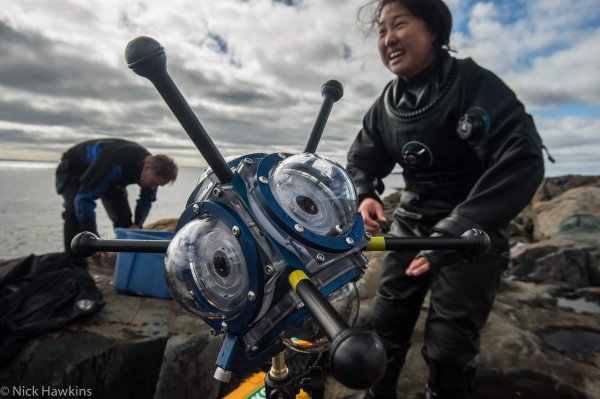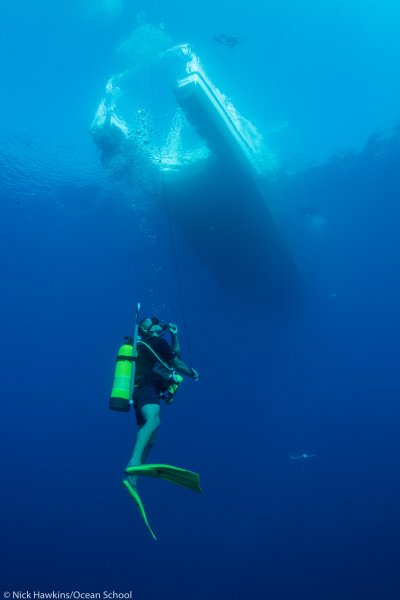
Ocean School – An unforgettable virtual experience
– By Heather Delagran and Sonya Lee –
Imagine you are flying over the lush temperate rainforest of British Columbia’s central coast. Thick vegetation covers the ground between towering trees. Two bears wander along a log-strewn beach. In the distance, there are rounded mountain peaks. Sunlight shines through the trees on a snowy mountainside. You look down and see a stream cutting through the forest, packed with salmon, their shining backs cutting the surface of the water. You dive in and swim upstream alongside the shimmering, ghostly bodies of transforming salmon.
These are the kinds of experiences that can help build a connection with the ocean and motivate us to protect our ocean and the watersheds that lead to them. These are the kind of virtual experiences Ocean School is bringing into classrooms. In this article, we will share a bit about Ocean School, and the process behind the creation of our latest module, the Harvest.

About Ocean School. Ocean School is a free educational website produced by the National Film Board of Canada in collaboration with the Ocean Frontier Institute at Dalhousie University. Our mission is to promote ocean literacy in youth, ages 11 to 15 years old so that they understand our influence on the ocean and the ocean’s influence on us. We combine documentary footage of marine science work with 360 video, virtual reality, and activities for the classroom that teachers can download and use.
Ocean School has over 65 pieces of media organized in five themed modules – Healthy Habitats, Evolving Ecosystems, Protecting Populations, Marine Migration, and, coming soon, The Harvest!
The Harvest module was filmed with the Haíɫzaqv Nation and the community of Bella Bella. It explores the deep inter-relationships between land, sea and people. In this module, you will learn how herring, salmon, and Haíɫzaqv people are interconnected in the rich ecosystem of what is now known as British Columbia’s Central Coast. This module celebrates the reciprocal relationship between the Haíɫzaqv and these keystone species—a relationship that’s over 14 000 years old!
We are grateful to the Haíɫzaqv Nation and the community of Bella Bella for making this module possible. The community shared invaluable time, knowledge and patience with the Ocean School team. There were four key pillars to our approach in the creation of this module and working with the Haíɫzaqv (Heiltsuk) Nation that are described in the following section. These were largely informed by Jess Housty’s article, “You’re not the Indian I had in mind”.
Openness and authenticity. We approached the research and development of the module filmed in Haíɫzaqv Nation with open minds. We did not form a production plan until we consulted extensively with the community and established a relationship of trust and understanding. It was important for us to find ways to invite Haíɫzaqv voices and perspectives into our process and find out what stories, science (traditional and western), issues and questions the community wanted to address.
Community collaboration. We collaboratively developed the educational framework for the module with educators, community leaders, Hereditary Chiefs, Heiltsuk Integrated Resource Management Department (HIRMD) and the Coastal Guardian Watchmen. The community helped to identify people, projects and stories to feature, including our youth host, Jordan Wilson. We also spent several days with Haíɫzaqv educators to develop the activities that accompany the filmed content. Together, we established a process to validate the final activities and usage of the Haíɫzaqv language in our content.

Ownership, cultural heritage and intellectual property. Throughout the production, we had conversations with key community members about ownership and transmission of knowledge and culture — Are there things that we shouldn’t film, or that we should only film with explicit permission? Ocean School returned to the community to gather feedback on early edits of the filmed content from HIRMD and community educators. We learned an incredible amount and came away with invaluable feedback. Working with our community liaison, we revised our content to address concerns from the community. Finally, we shared the revised media with the community for approval, before making them public.
Incorporating language. British Columbia is one of the most linguistically diverse places in the world, with over 34 unique Indigenous languages. Due to colonization and policies of forced assimilation, many of these languages, including Haíɫzaqv, are endangered. Language is a source of cultural heritage and knowledge. Many Indigenous languages have words to describe concepts that do not exist in English. Ocean School incorporated Haíɫzaqv language whenever appropriate into the Harvest module. This effort was made possible by the help and guidance of Haíɫzaqv educators, community leaders, Elder Elizabeth Brown and the community Language Committee.
Giving back and building capacity. We thought critically about how the community could benefit from collaborating with Ocean School. In our initial conversations with the community, we asked how we could give back. Our consulting educators identified a resource gap for educational materials that explored herring. This module intends to help fill that gap. We also provided usb sticks with all of the content so that community members and educators could access the content without needing high speed internet. Finally, once more covid restrictions are lifted, we hope to celebrate the completion of the module with the community.
That was our process in a nutshell! We are looking forward to sharing this module with Canada and the world in September 2021, as we continue to build partnerships that will allow us to create new content to address issues like biodiversity loss, plastic pollution and climate change.
Ocean School is empowering the next generation of ocean citizens, researchers, and innovators, with the knowledge and tools to investigate and design innovative solutions for the accelerating challenges that face the world’s ocean. Check out the trailer for the new module, The Harvest, and visit the Ocean School today!
Heather Delagran is an Education Producer with Ocean School and is an education specialist with an M.A in Educational Technology from Concordia University in Montreal, Quebec. Heather started her career as a secondary-school geography teacher in England and the Bahamas. She strongly believes in student-centred, inquiry-based learning. Heather is the author of the Burgundy Jazz Educator’s Guide and several human rights education materials and trainings. Heather has been a producer with Ocean School since 2017.
Sonya Lee is a Science Producer with Ocean School who holds a B.Sc from Dalhousie University in marine biology and international development studies. She started her career as a Science Educators at the Discovery Centre, teaching science workshops to grades P-12. As an advocate of promoting ocean literacy, Sonya was on the Canadian Network for Ocean Education’s board of directors from 2015-2017.
